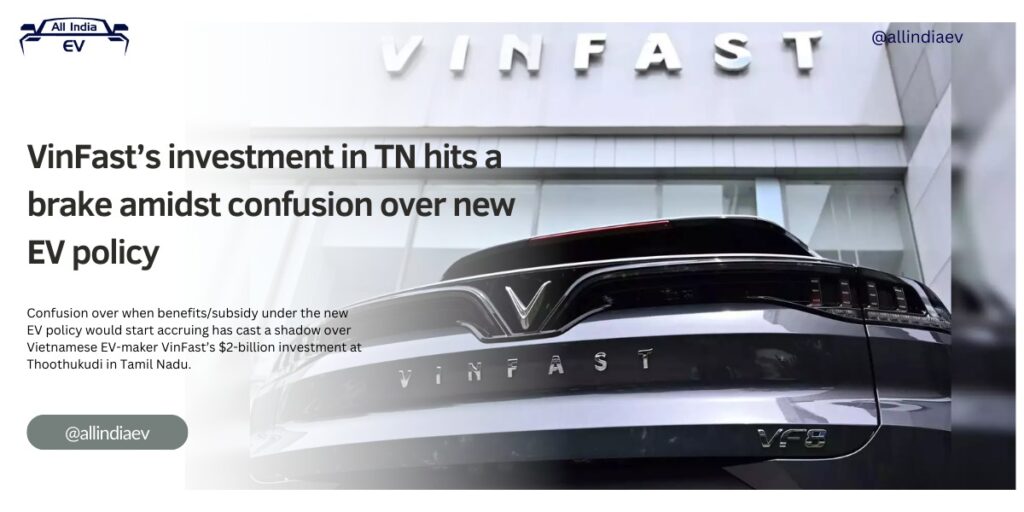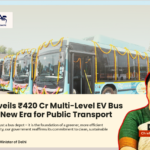
VinFast’s investment in TN hits a brake amidst confusion over new EV policy
VinFast, a leading Vietnamese EV manufacturer, is navigating through confusion concerning the applicability of subsidies under India’s newly formulated EV policy, potentially impacting its substantial $2 billion investment in Thoothukudi, Tamil Nadu. Recent discussions held at the Ministry of Heavy Industries (MHI) reveal significant discrepancies between the company’s expectations and the policy’s stipulations.
On April 18, a pivotal meeting was held at the Ministry of Heavy Industries (MHI), attended by significant stakeholders including Pham Sanh Chau, the CEO of VinFast India. The discussions revealed a crucial misunderstanding about the timing of the subsidies. It emerged that the benefits outlined in the new EV policy would only kick in once the policy itself is officially implemented, not retroactively from when investments begin.
The gathering, chaired by MHI Secretary Kamran Rizvi and Additional Secretary Hanif Qureshi, aimed to iron out these discrepancies. Attendees included top executives from Hyundai Motor India, Maruti Suzuki India, Mahindra & Mahindra, Tata Motors, and Toyota Kirloskar Motor. The meeting followed an earlier interaction in January with Commerce Minister Piyush Goyal, where VinFast executives were reportedly under the impression that policy benefits would be effective from the onset of their investments.
This misunderstanding was clarified during the April meeting. The MHI Secretary explained that the subsidy would apply post-policy implementation rather than from the commencement of investment activities. This clarification indicates a significant delay in when the benefits could be realized, shifting the investment dynamics for VinFast.
Further, MHI officials underscored other critical aspects of the policy, addressing another confusion regarding investment timelines. VinFast had previously thought they had five years to invest $500 million; however, the policy stipulates this amount must be invested within the first three years to qualify for full benefits, including maintaining a bank guarantee.
Additionally, the policy specifies that investments are only recognized after 240 days—comprising a 120-day application window followed by another 120 days for MHI evaluation. Only after receiving a confirmation from the Ministry does the investment cycle officially commence, thus beginning roughly eight months after initial activities.
The policy, approved earlier by the Centre, aims to attract major multinational EV manufacturers like Tesla and VinFast by facilitating the establishment of manufacturing units in India. It requires an initial investment of ₹4,150 crore and mandates that companies meet specific domestic value addition (DVA) thresholds—25% DVA within three years and 50% within five years, alongside the setup of manufacturing facilities and the start of commercial production within the same timeframe.
VinFast’s plan includes a phased investment, with $500 million earmarked for the first phase over five years, beginning with the project’s initiation. The establishment of its integrated EV facility is anticipated to generate between 3,000 and 3,500 jobs locally, significantly boosting employment in the region.
However, with the newly clarified policy details, there is now concern that VinFast might postpone further development and temporarily halt construction activities at the Thoothukudi site. The Vietnamese firm and the Tamil Nadu government had formalized their commitment through a Memorandum of Understanding (MoU) signed on January 6, signalling both parties’ readiness to proceed under the assumed conditions of immediate policy applicability.
The episode underscores the critical importance of clear communication and aligned understandings between foreign investors and local authorities regarding policy frameworks. For VinFast, aligning its strategic plans with the clarified policy stipulations will be essential to leverage the intended benefits and ensure the long-term success of its ambitious project in India.
As it stands, the company’s response to these developments remains awaited, and the next steps will be pivotal in determining the trajectory of this significant international collaboration in India’s burgeoning EV sector.




